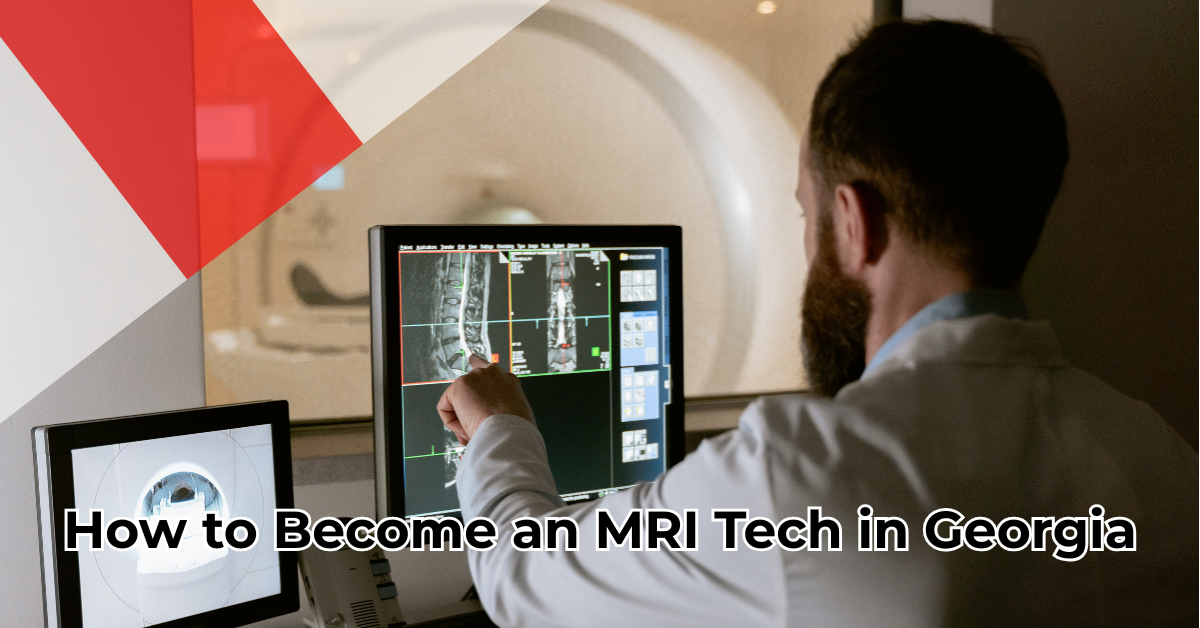One of the most sophisticated diagnostic instruments in contemporary healthcare is the Magnetic Resonance Imaging (MRI), and the MRI technologists contribute significantly to assist the physicians with the identification and treatment of diseases.
The needs of MRI techs have continued to grow in Georgia as a result of expansion in the number of hospitals, diagnostic centers, and other specialized clinics.
In case this is a rewarding career path you are contemplating, knowing the educational needs, the certification process, and employment prospects in Georgia will guide you in the right direction towards success.
1. How to Become an MRI Tech in Georgia Step by Step-by-Step Roadmap
Becoming an MRI technologist in Georgia involves meeting specific education and certification requirements while gaining practical clinical experience. Below is the structured roadmap to guide you:
Earn a High School Diploma or GED
A strong foundation in math, biology, and physics will prepare you for further studies. Most programs in Georgia require proof of a completed high school education or equivalent.
Complete an Accredited MRI Technologist Program
Students can choose between an Associate of Applied Science in Radiologic Technology (about 2 years) or a Bachelor’s degree in Radiologic Sciences (4 years). Many colleges in Georgia offer specialized MRI programs accredited by the Joint Review Committee on Education in Radiologic Technology (JRCERT).
Gain Clinical Experience
Programs typically include 1,000–1,500 hours of supervised clinical training in hospitals and imaging centers. This hands-on training is essential to prepare for real-world patient care and MRI machine operation.
Pass the ARRT MRI Certification Exam
After graduation, you must apply for certification through the American Registry of Radiologic Technologists (ARRT). Passing the exam ensures you are qualified to practice as a certified MRI technologist in Georgia.
Apply for State Licensure
Georgia follows ARRT certification as the main licensing standard. Some employers may require additional documentation, background checks, or CPR certification before hiring.
Start Your Career as an MRI Tech
Once licensed, you can apply for jobs in hospitals, diagnostic imaging centers, and specialty clinics. With experience, you can also specialize further or move into supervisory roles.
2. Education and Accredited MRI Technologist Programs in Georgia
The first major step in becoming an MRI tech in Georgia is enrolling in an accredited educational program. Accreditation is important because it ensures the program meets the high standards required for ARRT certification and future employment.
In Georgia, aspiring MRI technologists can pursue different academic pathways:
- Associate Degree in Radiologic Technology (2 years): This is the most common route. It covers patient care, anatomy, physiology, imaging techniques, and radiation safety.
- Bachelor’s Degree in Radiologic Sciences (4 years): Ideal for students who want more in-depth training and opportunities for leadership or advanced imaging roles.
- Certificate Programs (12–18 months): Designed for those who are already working as radiologic technologists and want to specialize in MRI.

Some of the recognized institutions in Georgia offering MRI-related programs include:
- Augusta University – College of Allied Health Sciences
- Grady Health System School of Radiologic Technology in Atlanta
- Georgia State University – Department of Radiologic Sciences
Both programs are a combination of classroom training and clinical rotations in affiliated hospitals or imaging centers. The tuition fee is usually between 7000 and 20000 dollars, depending on the kind of degree and the school you study at, whether a public or a private school. There are financial aid, scholarships and grants for work development to eligible students.
Earning an accredited program also qualifies you to meet the ARRT eligibility requirements, but it also provides you with an impressive academic and clinical base to succeed in this area.
3. Certification and ARRT MRI Requirements You Must Meet in 2025
After completing your education, the next essential step is certification through the American Registry of Radiologic Technologists (ARRT). In Georgia, ARRT certification serves as the primary standard for licensure and employment.
Here are the requirements in 2025 to become ARRT-certified in MRI:
- Education Completion: You must graduate from an ARRT-recognized, accredited MRI or radiologic technology program.
- Ethics Review: Applicants must comply with ARRT’s ethics standards, which include background checks and professional conduct guidelines.
- Examination: You must pass the ARRT MRI certification exam, which consists of about 200 multiple-choice questions covering MRI safety, patient positioning, anatomy, and imaging protocols.
- Application Fee: The exam application fee in 2025 is $225.
- Certification Maintenance: To keep your ARRT credential active, you need to complete 24 continuing education credits every 2 years and renew your certification annually.
Without ARRT certification, your career opportunities in Georgia will be very limited since most hospitals and imaging centers require it as a hiring standard. Many employers also provide exam preparation resources or reimburse exam fees to support new graduates.
Earning this credential not only proves your professional competence but also opens the door to higher salaries, specialized positions, and long-term career growth.
4. Practical Training Clinical Hours and Typical Program Duration
Classroom education provides theoretical knowledge, but the heart of MRI technologist training lies in hands-on clinical practice. Every accredited program in Georgia integrates extensive clinical rotations, ensuring that students graduate with real-world experience.
Clinical Hours Requirement: Most MRI programs in Georgia require between 1,000 and 1,500 hours of supervised clinical training.
These hours are completed in hospitals, outpatient imaging centers, and specialty diagnostic facilities. During this time, students learn to operate MRI scanners, position patients safely, manage contrast agents, and troubleshoot technical issues.
Program Duration:
- Associate degree programs typically take 22 to 24 months to finish.
- Bachelor’s degree programs span four years and often include leadership, advanced imaging, or research opportunities.
- Certificate programs for current radiologic technologists are shorter, lasting 12 to 18 months.
Competency Development: By graduation, students are expected to perform essential MRI procedures independently, handle emergency scenarios, and apply safety protocols such as MRI zone restrictions and screening for metallic implants.
This blend of classroom knowledge and clinical expertise ensures new graduates are well-prepared for ARRT exams and immediate employment across Georgia’s growing healthcare system.
5. Salary Job Outlook and Top Cities Hiring MRI Techs in Georgia
One of the most attractive aspects of becoming an MRI technologist in Georgia is the competitive salary and strong job growth. According to the latest 2025 data from the U.S. Bureau of Labor Statistics (BLS) and local healthcare employment reports:
- Average Annual Salary in Georgia: MRI techs earn about $82,300 per year (approximately $39.50 per hour). This is slightly higher than the national median of around $80,000 annually.
- Entry-Level Salary: New graduates typically start at $60,000 to $65,000 per year, depending on location and facility.
- Experienced Salary: With 5+ years of experience or specialization in advanced MRI procedures, salaries can exceed $95,000 annually in top healthcare centers.

Job Outlook 2025–2030:
Employment for MRI technologists in Georgia is expected to grow by 6–7 percent, driven by an aging population, increased reliance on advanced imaging, and expansion of private diagnostic centers.
Top Cities Hiring MRI Techs in Georgia:
- Atlanta – The state’s largest healthcare hub with top employers like Emory Healthcare, Piedmont Hospital, and Grady Health System.
- Augusta – Home to Augusta University Medical Center and a growing demand in regional hospitals.
- Savannah – A strong job market with a mix of private imaging clinics and large hospitals.
- Macon – Offers opportunities in both hospital networks and specialized diagnostic practices.
- Columbus – Expanding healthcare services have created steady demand for certified MRI technologists.
Overall, Georgia offers a promising career landscape with excellent earning potential and stable long-term demand for MRI techs.
6. Tips to Improve Job Prospects: Resume, Continuing Education, and Specializations
While completing your education and certification are the foundation, standing out in Georgia’s competitive healthcare market requires additional effort. Below are proven strategies to boost your career opportunities:
Develop a Good Resume and Cover Letter.
Emphasize your ARRT board certification, clinical experience and technical skills like patient placement, MRI safety measures and familiarity with imaging software. Customize your resume application to suit every job opportunity.
Complete Continuing Education.
ARRT mandates 24 continuing education (CE) credits each bi-annual period. However, exceeding this threshold will ensure that you are informed of the latest MRI-based technology, new imaging methods, and new patient care practices. Technologists who engage in lifetime learning are also appreciated by many hospitals in Georgia.
Financial Planning and Analysis: Major in Advanced Imaging.
You may want to take other certifications in other fields, like cardiac MRI, functional brain imaging or breast MRI. Such specializations may make you more valuable in large hospitals and research centers, allowing them to pay more and assume leadership positions.
Join and Network Professional Associations.
Joining such organizations as the Georgia Society of Radiologic Technologists (GSRT) will be an opportunity to network, access workshops, and possibly employment opportunities.
Develop Emerging Healthcare Experiences.
Working in a hospital setting and an outpatient setting will extend your scope and diversify you. In urban areas such as Atlanta and Savannah, the employers of techs are usually interested in candidates who have a diversified clinical background.
By following these strategies, you can position yourself not only as a qualified MRI technologist but also as a strong candidate for long-term career growth in Georgia’s healthcare system.
Conclusion
The process of becoming an MRI technologist is very gratifying in Georgia and requires a combination of education, certification, and clinical expertise. This normally takes an average of 2 to 4 years when you do an associate program, a bachelor’s or a certificate program.
Having ARRT certification as the key to employment, graduates may expect an average salary of more than 80,000 dollars and a good job perspective throughout the expanding healthcare sector in Georgia.
Georgia presents great prospects to MRI technologists in 2025 and further on, whether a person is beginning their career in healthcare or deciding to advance to another related domain. You can pursue a stable, respected and well-compensated career as an MRI tech by focusing on accredited education, certification and continuous learning.
FAQs
How much does an MRI tech make in Georgia?
MRI technologists in Georgia earn an average of $82,300 per year in 2025, with entry-level salaries starting around $60,000 and experienced professionals making up to $95,000.
How long does it take to become a radiology tech in Georgia?
It typically takes 2 years to complete an associate degree in radiologic technology, while bachelor’s programs may take 4 years. Certificate programs for existing techs last 12–18 months.
What is the fastest way to become an MRI tech?
The fastest route is completing a 12–18 month certificate program if you are already a licensed radiologic technologist. New students generally take at least 2 years through an associate program.
Do you need a license to be a radiology tech in Georgia?
Yes. Georgia requires radiology and MRI technologists to hold ARRT certification, which serves as the primary licensing standard for employment across the state.

